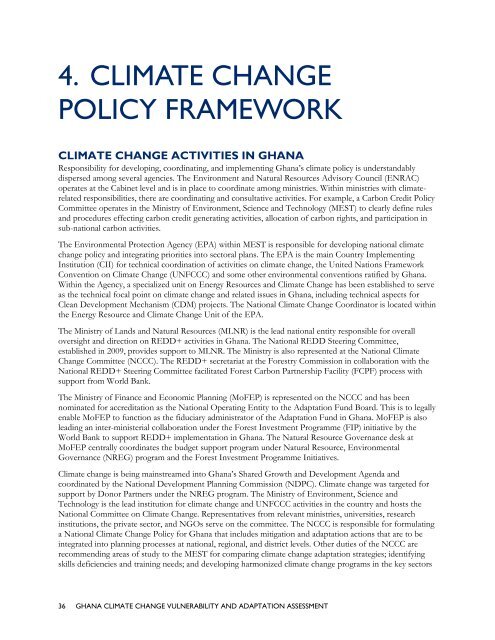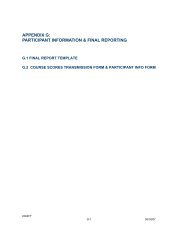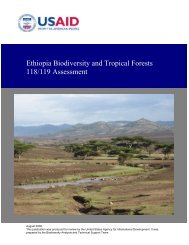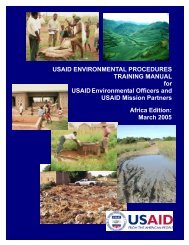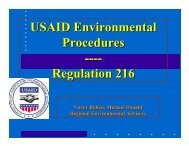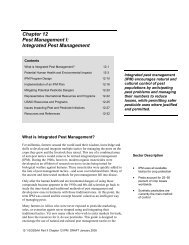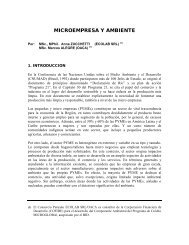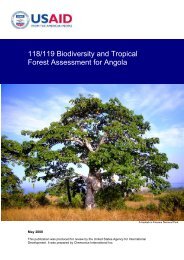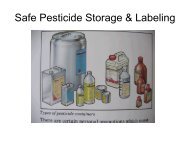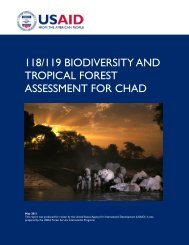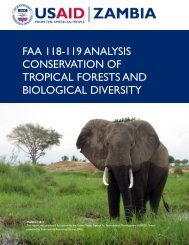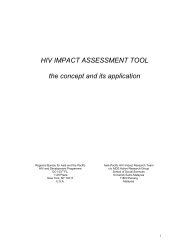ghana climate change vulnerability and adaptation assessment
ghana climate change vulnerability and adaptation assessment
ghana climate change vulnerability and adaptation assessment
- No tags were found...
Create successful ePaper yourself
Turn your PDF publications into a flip-book with our unique Google optimized e-Paper software.
4. CLIMATE CHANGEPOLICY FRAMEWORKCLIMATE CHANGE ACTIVITIES IN GHANAResponsibility for developing, coordinating, <strong>and</strong> implementing Ghana’s <strong>climate</strong> policy is underst<strong>and</strong>ablydispersed among several agencies. The Environment <strong>and</strong> Natural Resources Advisory Council (ENRAC)operates at the Cabinet level <strong>and</strong> is in place to coordinate among ministries. Within ministries with <strong>climate</strong>relatedresponsibilities, there are coordinating <strong>and</strong> consultative activities. For example, a Carbon Credit PolicyCommittee operates in the Ministry of Environment, Science <strong>and</strong> Technology (MEST) to clearly define rules<strong>and</strong> procedures effecting carbon credit generating activities, allocation of carbon rights, <strong>and</strong> participation insub-national carbon activities.The Environmental Protection Agency (EPA) within MEST is responsible for developing national <strong>climate</strong><strong>change</strong> policy <strong>and</strong> integrating priorities into sectoral plans. The EPA is the main Country ImplementingInstitution (CII) for technical coordination of activities on <strong>climate</strong> <strong>change</strong>, the United Nations FrameworkConvention on Climate Change (UNFCCC) <strong>and</strong> some other environmental conventions ratified by Ghana.Within the Agency, a specialized unit on Energy Resources <strong>and</strong> Climate Change has been established to serveas the technical focal point on <strong>climate</strong> <strong>change</strong> <strong>and</strong> related issues in Ghana, including technical aspects forClean Development Mechanism (CDM) projects. The National Climate Change Coordinator is located withinthe Energy Resource <strong>and</strong> Climate Change Unit of the EPA.The Ministry of L<strong>and</strong>s <strong>and</strong> Natural Resources (MLNR) is the lead national entity responsible for overalloversight <strong>and</strong> direction on REDD+ activities in Ghana. The National REDD Steering Committee,established in 2009, provides support to MLNR. The Ministry is also represented at the National ClimateChange Committee (NCCC). The REDD+ secretariat at the Forestry Commission in collaboration with theNational REDD+ Steering Committee facilitated Forest Carbon Partnership Facility (FCPF) process withsupport from World Bank.The Ministry of Finance <strong>and</strong> Economic Planning (MoFEP) is represented on the NCCC <strong>and</strong> has beennominated for accreditation as the National Operating Entity to the Adaptation Fund Board. This is to legallyenable MoFEP to function as the fiduciary administrator of the Adaptation Fund in Ghana. MoFEP is alsoleading an inter-ministerial collaboration under the Forest Investment Programme (FIP) initiative by theWorld Bank to support REDD+ implementation in Ghana. The Natural Resource Governance desk atMoFEP centrally coordinates the budget support program under Natural Resource, EnvironmentalGovernance (NREG) program <strong>and</strong> the Forest Investment Programme Initiatives.Climate <strong>change</strong> is being mainstreamed into Ghana’s Shared Growth <strong>and</strong> Development Agenda <strong>and</strong>coordinated by the National Development Planning Commission (NDPC). Climate <strong>change</strong> was targeted forsupport by Donor Partners under the NREG program. The Ministry of Environment, Science <strong>and</strong>Technology is the lead institution for <strong>climate</strong> <strong>change</strong> <strong>and</strong> UNFCCC activities in the country <strong>and</strong> hosts theNational Committee on Climate Change. Representatives from relevant ministries, universities, researchinstitutions, the private sector, <strong>and</strong> NGOs serve on the committee. The NCCC is responsible for formulatinga National Climate Change Policy for Ghana that includes mitigation <strong>and</strong> <strong>adaptation</strong> actions that are to beintegrated into planning processes at national, regional, <strong>and</strong> district levels. Other duties of the NCCC arerecommending areas of study to the MEST for comparing <strong>climate</strong> <strong>change</strong> <strong>adaptation</strong> strategies; identifyingskills deficiencies <strong>and</strong> training needs; <strong>and</strong> developing harmonized <strong>climate</strong> <strong>change</strong> programs in the key sectors36 GHANA CLIMATE CHANGE VULNERABILITY AND ADAPTATION ASSESSMENT


